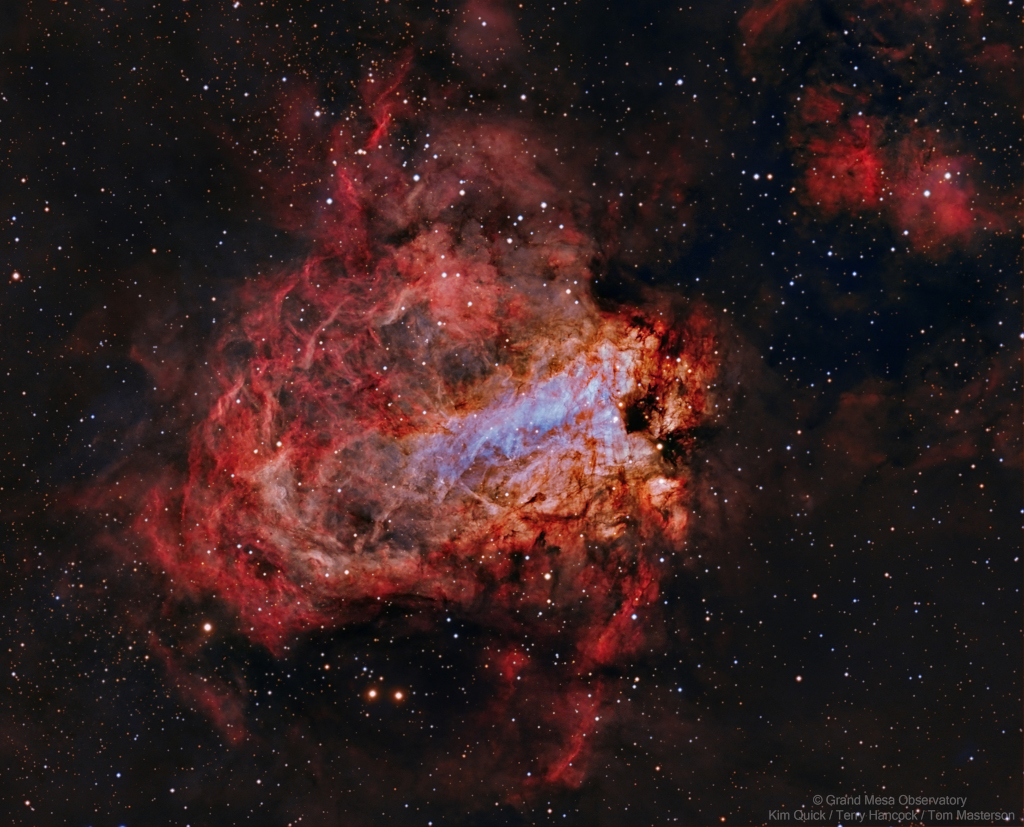Blog
Melvin Howard Tormé (September 13, 1925 – June 5, 1999), nicknamed “The Velvet Fog“, was an American musician, singer, composer, arranger, drummer, actor, and author. He composed the music for “The Christmas Song” (“Chestnuts Roasting on an Open Fire”) and co-wrote the lyrics with Bob Wells. Tormé won 2 Grammy Awards and was nominated a total of 14 times.
Melvin Howard Tormé was born in Chicago, Illinois, to William David Tormé, a Jewish immigrant from Poland, and Betty Tormé (née Sopkin), a New York City native. He graduated from Hyde Park High School. A child prodigy, he first performed professionally at age four with the Coon-Sanders Orchestra, singing “You’re Driving Me Crazy” at Chicago’s Blackhawk restaurant.
more...Some 4 billion light-years away, massive galaxy cluster Abell 370 is captured in this sharp Hubble Space Telescope snapshot. The cluster of galaxies only appears to be dominated by two giant elliptical galaxies and infested with faint arcs. In reality, the fainter, scattered bluish arcs, along with the dramatic dragon arc below and left of center, are images of galaxies that lie far beyond Abell 370. About twice as distant, their otherwise undetected light is magnified and distorted by the cluster’s enormous gravitational mass, overwhelmingly dominated by unseen dark matter. Providing a tantalizing glimpse of galaxies in the early universe, the effect is known as gravitational lensing. A consequence of warped spacetime, lensing was predicted by Einstein almost a century ago. Far beyond the spiky foreground Milky Way star at lower right, Abell 370 is seen toward the constellation Cetus, the Sea Monster. It was the last of six galaxy clusters imaged in the Frontier Fields project.

Neil Ellwood Peart OC (/pɪərt/; September 12, 1952 – January 7, 2020) was a Canadian and American musician, best known as the drummer and primary lyricist of the rock band Rush. Peart earned numerous awards for his musical performances, including an induction into the Modern Drummer Readers Poll Hall of Fame in 1983 at the age of thirty, making him the youngest person ever so honoured. He was known to fans by the nickname ‘The Professor’. His drumming was renowned for its technical proficiency and his live performances for their exacting nature and stamina.
Peart was born in Hamilton, Ontario, and grew up in Port Dalhousie (now part of St. Catharines). During adolescence, he floated between regional bands in pursuit of a career as a full-time drummer. After a discouraging stint in England, Peart returned home to concentrate on music where he joined Rush, a Toronto band, in mid-1974, six years after its formation. Together they released nineteen studio albums, with ten exceeding a million copies sold in the United States. Billboard lists the band third in “most consecutive gold or platinum albums by a rock band”.
Early in his career, Peart’s performance style was deeply rooted in hard rock. He drew most of his inspiration from drummers such as Keith Moon, Ginger Baker, and John Bonham, players who at the time were at the forefront of the British hard rock scene. As time passed, he began to emulate jazz and big band musicians Gene Krupa and Buddy Rich. In 1994, Peart became a friend and pupil of jazz instructor Freddie Gruber. It was during this time that Peart revamped his playing style by incorporating jazz and swing components.
In addition to serving as Rush’s primary lyricist, Peart published several memoirs about his travels. His lyrics for Rush addressed universal themes and diverse subjects including science fiction, fantasy, and philosophy, as well as secular, humanitarian, and libertarian themes. Peart wrote a total of seven nonfiction books focused on his travels and personal stories. He also coauthored with Kevin J. Anderson three steampunk fantasy novels based on Rush’s final album, Clockwork Angels. The two also wrote a dark fantasy novella, Drumbeats, inspired by Peart’s travels in Africa.
Peart announced his retirement from touring in an interview with Drumhead Magazine in December 2015. In January 2018, bandmate Alex Lifeson confirmed that Rush had disbanded also due to Peart’s health issues. During his last years Peart lived in Santa Monica, California, with his wife, Carrie Nuttall, and daughter. After a three and a half year illness, Peart died of glioblastoma on January 7, 2020, at age 67.
more...Maria Muldaur (born Maria Grazia Rosa Domenica D’Amato; September 12, 1942) is an American folk and blues singer who was part of the American folk music revival in the early 1960s. She recorded the 1973 hit song “Midnight at the Oasis” and has recorded albums in the folk, blues, early jazz, gospel, country, and R&B traditions.
She was the wife of musician Geoff Muldaur and is the mother of singer-songwriter Jenni Muldaur.
Muldaur was born in Greenwich Village, New York City, where she attended Hunter College High School.
Muldaur cites as early musical influences classic country music by Kitty Wells, Hank Williams, Hank Snow, Hank Thompson, Ernest Tubb, and Bob Wills and the Texas Playboys; early rhythm and blues artists like Chuck Willis, Little Richard, Ruth Brown, Fats Domino, and Muddy Waters; Alan Freed “rock ‘n’ roll” shows; and doo-wop groups such as The Platters and The Five Satins.
more...
William Alonzo “Cat” Anderson (September 12, 1916 – April 29, 1981) was an American jazz trumpeter known for his long period as a member of Duke Ellington‘s orchestra and for his wide range, especially his ability to play in the altissimo register.
Born in Greenville, South Carolina, Anderson lost both parents when he was four years old, and was sent to live at the Jenkins Orphanage in Charleston, where he learned to play trumpet. Classmates gave him the nickname “Cat” (which he used all his life) based on his fighting style.
more...Teaching a Rhythm Roots Workshop Residency at two locations; St Therese New Hope and Oxbow Lake Senior Living (https://www.sainttherese.org/) on Mondays 10am & 1230pm September 11th thru November 6th 2023. Celebrating world rhythms and cultures for healing and memory care.

This dream-like Picture of the Week features the galaxy known as NGC 3156. It is a lenticular galaxy, meaning that it falls somewhere between an elliptical and a spiral galaxy. It lies about 73 million light-years from Earth, in the minor equatorial constellation Sextans.
Sextans is a small constellation that belongs to the Hercules family of constellations. It itself is a constellation with an astronomical theme, being named for the instrument known as the sextant. Sextants are often thought of as navigational instruments that were invented in the 18th century. However, the sextant as an astronomical tool has been around for much longer than that: Islamic scholars developed astronomical sextants many hundreds of years earlier in order to measure angles in the sky. A particularly striking example is the enormous sextant with a radius of 36 metres that was developed by Ulugh Beg of the Timurid dynasty in the fifteenth century, located in Samarkand in present-day Uzbekistan. These early sextants may have been a development of the quadrant, a measuring device proposed by Ptolemy. A sextant, as the name suggests, is shaped like one-sixth of a circle, approximately the shape of the constellation.
Sextants are no longer in use in modern astronomy, having been replaced by instruments that are capable of measuring the positions of stars and astronomical objects much more accurately and precisely. NGC 3156 has been studied in many ways other than determining its precise position — from its cohort of globular clusters, to its relatively recent star formation, to the stars that are being destroyed by the supermassive black hole at its centre.
[Image Description: A large elliptical galaxy. It appears to be formed of faint, grey, concentric ovals that grow progressively brighter towards the core, where there is a very bright point, and fade away at the edge. Two threads of dark red dust cross the galaxy’s disc, near the centre. The background is black and mostly empty, with only a few point stars and small galaxies.]

This dream-like Picture of the Week features the galaxy known as NGC 3156. It is a lenticular galaxy, meaning that it falls somewhere between an elliptical and a spiral galaxy. It lies about 73 million light-years from Earth, in the minor equatorial constellation Sextans.
Sextans is a small constellation that belongs to the Hercules family of constellations. It itself is a constellation with an astronomical theme, being named for the instrument known as the sextant. Sextants are often thought of as navigational instruments that were invented in the 18th century. However, the sextant as an astronomical tool has been around for much longer than that: Islamic scholars developed astronomical sextants many hundreds of years earlier in order to measure angles in the sky. A particularly striking example is the enormous sextant with a radius of 36 metres that was developed by Ulugh Beg of the Timurid dynasty in the fifteenth century, located in Samarkand in present-day Uzbekistan. These early sextants may have been a development of the quadrant, a measuring device proposed by Ptolemy. A sextant, as the name suggests, is shaped like one-sixth of a circle, approximately the shape of the constellation.
Sextants are no longer in use in modern astronomy, having been replaced by instruments that are capable of measuring the positions of stars and astronomical objects much more accurately and precisely. NGC 3156 has been studied in many ways other than determining its precise position — from its cohort of globular clusters, to its relatively recent star formation, to the stars that are being destroyed by the supermassive black hole at its centre.
[Image Description: A large elliptical galaxy. It appears to be formed of faint, grey, concentric ovals that grow progressively brighter towards the core, where there is a very bright point, and fade away at the edge. Two threads of dark red dust cross the galaxy’s disc, near the centre. The background is black and mostly empty, with only a few point stars and small galaxies.]
more...Leo Kottke (born September 11, 1945) is an acoustic guitarist. He is known for a fingerpicking style that draws on blues, jazz, and folk music, and for syncopated, polyphonic melodies. He has overcome a series of personal obstacles, including partial loss of hearing and a nearly career-ending bout with tendon damage in his right hand, to emerge as a widely recognized master of his instrument. He resides in the Minneapolisarea with his family.
Focusing primarily on instrumental composition and playing, Kottke also sings sporadically, in an unconventional yet expressive baritone described by himself as sounding like “geese farts on a muggy day”. In concert, Kottke intersperses humorous and often bizarre monologues with vocal and instrumental selections from throughout his career, played solo on six and twelve string guitars.
Born in Athens, Georgia, Kottke moved with his parents so frequently that he was raised in twelve different states. As a youth living in Muskogee, Oklahoma, he was influenced by folk and delta blues music, notably that of Mississippi John Hurt. Kottke learned to play trombone and violin before trying the guitar and developing his own unconventional picking style.
more...Victor Lemonte Wooten (born September 11, 1964) is an American bassist, songwriter, and record producer. He has been the bassist for Béla Fleck and the Flecktones since the group’s formation in 1988 and a member of the band SMV with two other bassists, Stanley Clarke and Marcus Miller. From 2017 to 2019 he recorded as the bassist for the metal band Nitro.
He owns Vix Records, which releases his albums. He wrote the novel The Music Lesson: A Spiritual Search for Growth Through Music. He later released the book’s sequel, The Spirit of Music: The Lesson Continues, on February 2, 2021.
Wooten is the recipient of five Grammy Awards. He won the Bass Player of the Year award from Bass Player magazine three times and is the first person to win the award more than once. In 2011, he was ranked No. 10 in the Top 10 Bassists of All Time by Rolling Stone magazine.
In 2018–2019 Wooten was diagnosed with a rare neurological condition called focal dystonia in his hands and upper body, which had been limiting his ability to play in previous years, but has since abated somewhat.
Born to Dorothy and Elijah Wooten, Victor is the youngest of the five Wooten brothers; Regi, Roy, Rudy, and Joseph Wooten are all musicians. Regi began to teach Victor to play bass when he was two, and by the age of six, he was performing with his brothers in their family band, The Wooten Brothers Band. As a United States Air Force family, they moved often when Wooten was young. The family settled in Newport News, Virginia, in 1972. Wooten graduated from Denbigh High School in 1982.
more...Hiram Law Bullock (September 11, 1955 – July 25, 2008) was an American guitarist known mainly for playing in jazz funk and jazz fusion, but he also worked as a session musician in a variety of genres.
Bullock was born in Osaka, Japan, to African American parents serving in the U.S. military. At the age of two he returned to Baltimore, Maryland, with his parents and showed musical talent. He studied piano at the city’s Peabody Conservatory of Music, giving his first public performance at the age of six. After playing saxophoneand bass guitar, he took up the electric guitar at age sixteen.
more...Roosevelt “Baby Face” Willette (September 11, 1933 – April 1, 1971) was an American hard bop and soul-jazz musician who played the Hammond organ. He was born Roosevelt James Willett (no “e”), in Little Rock, Arkansas, in 1933 according to researchers Bob Eagle and Eric LeBlanc, though other sources state 1934 or 1937. According to the liner notes on his first Blue Note album, Grant’s First Stand, Willette was born in New Orleans.
His mother was a missionary who played the piano in the church where his father was a minister. As a result, his musical roots were in gospel. Willette became involved in music by playing the piano for various gospel groups, and accompanied his sisters Dorothy and Georgia, who toured and recorded as the Willett Sisters. He spent his early career travelling across the United States, Canada and Cuba, as pianist with the bands of King Kolax, Joe Houston, Johnny Otis and Big Jay McNeely, among others.
more...
Sculpted by stellar winds and radiation, the star factory known as Messier 17 lies some 5,500 light-years away in the nebula-rich constellation Sagittarius. At that distance, this 1/3 degree wide field of view spans over 30 light-years. The sharp composite, color image highlights faint details of the region’s gas and dust clouds against a backdrop of central Milky Way stars. Stellar winds and energetic light from hot, massive stars formed from M17’s stock of cosmic gas and dust have slowly carved away at the remaining interstellar material, producing the cavernous appearance and undulating shapes. M17 is also known as the Omega Nebula or the Swan Nebula.

William B. Lawsha, better known as Prince Lasha , (September 10, 1929 – December 12, 2008)was an American jazz alto saxophonist, baritone saxophonist, flautist, clarinetist and English horn player.
He was born in Fort Worth, Texas,[2][3][4] where he came of age studying and performing alongside fellow I.M. Terrell High Schoolstudents John Carter, Ornette Coleman, King Curtis, Charles Moffett, and Dewey Redman.
Lasha moved to California during the 1950s. In the 1960s, he was active in the burgeoning free jazz movement, of which his Fort Worth cohort Ornette Coleman was a pioneer. Lasha recorded with Eric Dolphy (Iron Man and Conversations, both in 1963) and the Elvin Jones/Jimmy Garrison Sextet featuring McCoy Tyner (Illumination!,also in 1963).
more...More Posts
- World Music with Mamar Kassey
- Daily Roots with Nicodemus
- The Cosmos with NGC 1027 and IC 1805
- Clifton Anderson Day
- Jimmy Blanton Day
- World Music with Miguel de los Reyes
- Daily Roots with Yami Bolo
- The Cosmos with SPX 1062
- Eddie Gomez Day
- Steve Swallow Day
- Leon Thomas Day
- World Music with Culture Musical Club & Bi Kidude
- World Music with Culture Musical Club & Bi Kidude
- Daily Roots with Miniman
- Rhythm Roots Workshop at PRI Minneapolis 10-3-18
- The Cosmos with W 40
- Stevie Ray Vaughn Day
- Von Freeman Day
- World Music with Noe Hernandez Cantarell
- Daily Roots with Ziggy Marley


